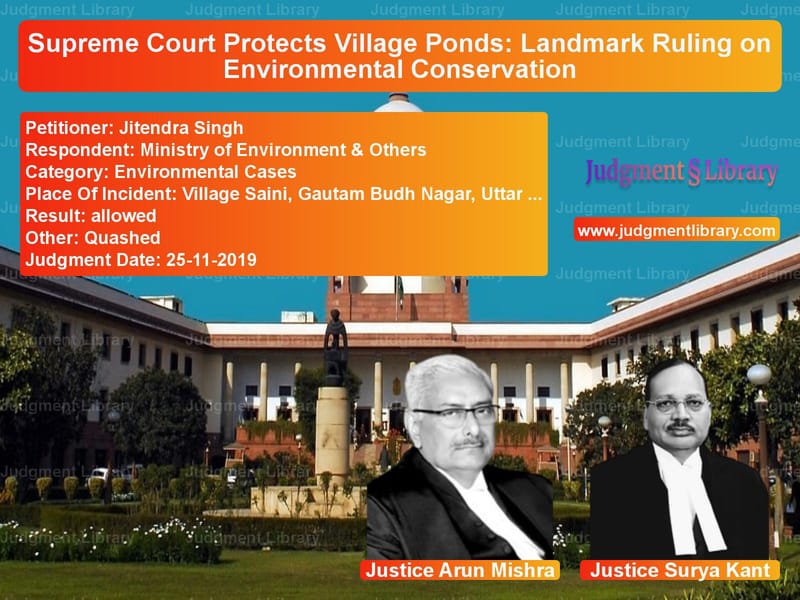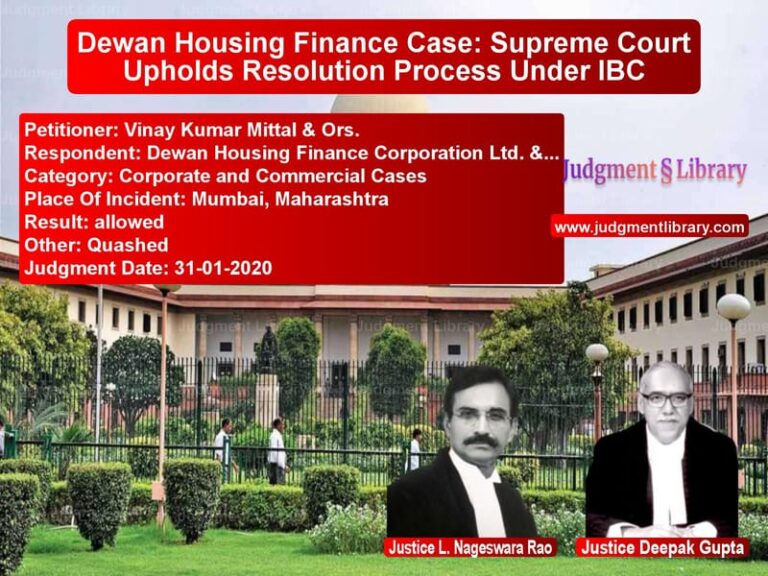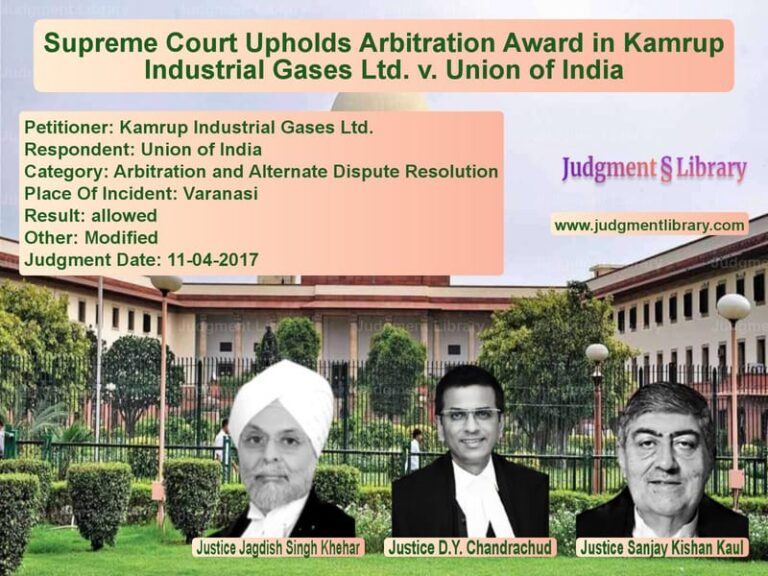Supreme Court Protects Village Ponds: Landmark Ruling on Environmental Conservation
The case of Jitendra Singh vs. Ministry of Environment & Others is a landmark judgment in environmental law, addressing the illegal allotment of village ponds to private industrialists. The Supreme Court had to determine whether such allotments violated environmental protection laws and fundamental rights, particularly under Article 21 of the Constitution. This ruling sets a precedent for the protection of common water bodies and reinforces the responsibility of the state in preserving natural resources.
The judgment emphasizes the importance of water bodies in maintaining ecological balance, protecting biodiversity, and sustaining rural livelihoods. By striking down the allotment of common ponds, the Court reaffirmed the principle that environmental conservation cannot be compromised for commercial interests.
Background of the Case
The dispute arose when Jitendra Singh, a resident of village Saini, Tehsil Dadri, District Gautam Budh Nagar, filed a petition challenging the illegal allotment of village ponds to private industrialists, including M/s Sharp Enterprises Pvt. Ltd.. His key contentions were:
- The ponds were historically used by the villagers and had been recorded as public water bodies in the revenue records.
- The land was allotted to private industrialists without following due process, in violation of environmental laws.
- The development of alternate water bodies as compensation was not a viable solution, as it disrupted the local ecosystem.
- The authorities failed to conduct proper environmental impact assessments before allowing industrial encroachments.
Arguments by the Petitioner
Jitendra Singh, represented by his legal team, made the following arguments:
- Violation of Environmental Laws: The allotment was done without mandatory environmental clearances under the Environmental Protection Act, 1986 and Wetlands (Conservation and Management) Rules, 2010.
- Public Trust Doctrine: Water bodies are part of the community’s natural heritage and should be protected under the public trust doctrine.
- Impact on Rural Livelihoods: The ponds provided essential water for agriculture, drinking, and cattle, and their destruction harmed the local population.
- Failure of Authorities: Despite multiple representations, local authorities failed to take action, forcing the petitioner to seek judicial intervention.
Arguments by the Respondents
The respondents, including the Greater Noida Industrial Development Authority (GNIDA), the Ministry of Environment, and private industrialists, defended the allotment by stating:
- The land was legally acquired for industrial development.
- Alternative water bodies, 1.25 times larger than the original ponds, were being developed.
- The petitioner was motivated by personal interests rather than environmental concerns.
Supreme Court’s Judgment
The Supreme Court ruled in favor of the petitioner and struck down the illegal allotments, making the following key observations:
1. Protection of Public Water Bodies
- The Court reaffirmed the ruling in Hinch Lal Tiwari vs. Kamala Devi (2001) and Jagpal Singh vs. State of Punjab (2011), stating that ponds are protected under the public trust doctrine.
- The Court observed:
“Water bodies are essential for sustaining ecological balance. Their destruction cannot be justified under the pretext of industrial development.”
2. Violation of Environmental Laws
- The Court noted that the allotment violated the Wetlands (Conservation and Management) Rules, 2010, which prohibit reclamation of water bodies.
- The authorities failed to conduct a proper environmental impact assessment.
3. Inadequacy of Alternative Water Bodies
- The Court rejected the argument that alternative ponds could replace the destroyed ones, stating:
“The respondents’ scheme of allowing destruction of existing water bodies and providing for replacements exhibits a mechanical application of environmental protection.”
- The natural ecosystem surrounding a pond cannot be artificially replicated.
4. Constitutional Mandate to Protect the Environment
- The judgment emphasized the State’s duty under Article 48-A and the citizens’ duty under Article 51-A(g) to protect and improve the environment.
- The Court ruled:
“Protection of such village commons is essential to safeguard the fundamental right to life under Article 21 of the Constitution.”
5. Restoration of the Water Bodies
- The Court ordered the authorities to restore, maintain, and protect the original ponds.
- All obstructions in the natural flow of water to the ponds must be removed within three months.
Impact of the Judgment
This ruling has significant implications for environmental conservation and governance:
- Strengthens Protection of Public Commons: Water bodies cannot be transferred for commercial purposes without due process.
- Sets a Precedent for Future Environmental Cases: Reinforces the judiciary’s role in protecting natural resources.
- Limits Industrial Expansion in Ecologically Sensitive Areas: Industrial projects must comply with environmental laws and cannot arbitrarily acquire community resources.
Conclusion
The Supreme Court’s judgment in Jitendra Singh vs. Ministry of Environment & Others serves as a powerful precedent for environmental protection. By upholding the rights of villagers and preserving public water bodies, the ruling reinforces the fundamental principles of environmental justice. The decision ensures that development does not come at the cost of ecological sustainability and reaffirms the State’s duty to safeguard natural resources for future generations.
Petitioner Name: Jitendra Singh.Respondent Name: Ministry of Environment & Others.Judgment By: Justice Arun Mishra, Justice Surya Kant.Place Of Incident: Village Saini, Gautam Budh Nagar, Uttar Pradesh.Judgment Date: 25-11-2019.
Don’t miss out on the full details! Download the complete judgment in PDF format below and gain valuable insights instantly!
Download Judgment: Jitendra Singh vs Ministry of Environm Supreme Court of India Judgment Dated 25-11-2019.pdf
Direct Downlaod Judgment: Direct downlaod this Judgment
See all petitions in Public Interest Litigation
See all petitions in Fundamental Rights
See all petitions in Legislative Powers
See all petitions in Judgment by Arun Mishra
See all petitions in Judgment by Surya Kant
See all petitions in allowed
See all petitions in Quashed
See all petitions in supreme court of India judgments November 2019
See all petitions in 2019 judgments
See all posts in Environmental Cases Category
See all allowed petitions in Environmental Cases Category
See all Dismissed petitions in Environmental Cases Category
See all partially allowed petitions in Environmental Cases Category







